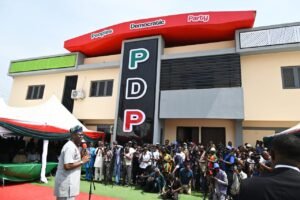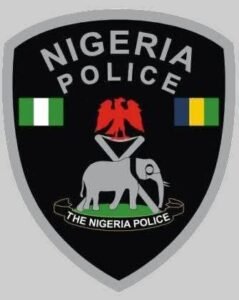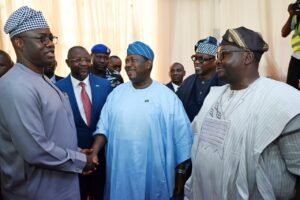Shhhhh… the President has a flight to catch! by Festus Adedayo.

No doubt, photographs evoke metaphors, imageries and diverse interpretations. Imagery was evoked in my mind as I read President Bola Tinubu’s remarks during his recent adventure to China. He spoke while addressing Nigerians living in that country. “Nigeria is going through reforms, and we are taking very bold and unprecedented decisions. For example, you might have been hearing from home in the last few days about fuel prices. But, can we help it?” the president said cavalierly like a cruel surgeon about to dissect a patient to whom he had neither empathy nor any iota of feeling. We had thought the president was not aware of our interminable queues at petrol stations since he was in far away China. We thought he didn’t know that Nigeria was literally comatose as Nigerians burnt precious man hours on petrol queues. But, with that statement, we now know that our president is aware that Nigerians are dying as a result of his so-called reforms. Nigerians’ situation today is such that, even if one was as cold-bloodedly unfeeling as to be able to chew the meatless, ugly head of a tortoise, they would empathize with them.
Tinubu’s coldblooded statement on his reforms is not dissimilar from the image provoked by the award-winning photographer, Kevin Carter. Aged 33, Carter’s highly-rated photo appeared in the New York Times of March 26, 1993. It was the photo of a famine-stricken Sudanese boy. Initially thought to be a girl, his name was later found out to be Kong Nyong. The boy had collapsed of intense hunger and lay on his face in the hot desert sun of Sudan. He had an empty food bowl hidden beside his face like an Almajiri. A beaded necklace of his Sudanese nationality jutted out of his feeble neck. He was said to be on his way to Ayod, the United Nations ration centre in Sudan, which was about a half-kilometre away. As he walked languidly down the coarse road of the desert, all of a sudden, Kong’s hungry strength failed him.
Less than a meter from the collapsed boy was the unnerving figure of a vulture eyeing the gaunt boy and awaiting his eventual death, so that it could commence his devouring. Carter, on a United Nations photography assignment, according to him, took diverse photographs of the “interesting scene” of the collapsed boy and hurriedly left the scene. The photo went mega viral. Although, entitled ‘The Struggling Girl’, it won the Pulitzer Prize for Feature Photography in 1994, Carter committed suicide four months after, on July 27, 1994. He poisoned himself with carbon monoxide. Carter had been reportedly taunted by the world and haunted by what people perceived as his inhuman treatment of the dying boy. A caller on a radio programme, who asked what Carter did to help Kong after taking the “interesting” picture of the young boy, was shocked at his curt reply of, “I had a plane to catch.” Carter had earlier confessed to his friend that, “I see all this, and all I can think of is Megan,” his young daughter. The radio caller’s stinging retort was the clincher. It led to an emotional turmoil that eventually led to Carter’s breakdown and suicide. The radio caller had told him pointedly: “On that field were two vultures – you and the cadaver-eating bird!”
Nigeria is at the juncture where three footpaths meet. It is a critical intersection that troubles the stranger newly come to town. Speaking directly to the dilemma of a stranger at a loss on which of the three intersections to follow, Yoruba aptly named the juncture Ìkóríta méta tíí dààmú àlejò. There seems to be no need for pretext any longer. Efunsetan is Prof Akinwumi Ishola’s dramatization of the exploits of Efunsetan Aniwura, the powerful matriarch and pre-eminent slave merchant of Ibadan in the 19th century. At that intersection when she finds out that her slave had been impregnated by a fellow slave, Efunsetan burst out into a scornful laughter. I paraphrase her hysterics: “The wild wind has blown and the naked rump of the hen is free to be beheld by all!”
It is same for Nigerians. The duo of those who aided and abetted the current runners of Nigeria into office, and those who didn’t, have come to same intersection. Bishop Mathew Hassan-Kukah drew the grim picture succinctly, in a recent beautifully arresting imagery. “A girl was asked, ‘which party are you, APC, LP or PDP?,’ she said: ‘I am hungry’”.
In literature, at the final part of a play, film, or narrative, when a natural resolution and the final strands of a plot are tied together, with knotty matters straightened, a denouement is said to have been achieved. Here, Yoruba conjure the allegory of the dead (Ení kú) and the lost (pèlú eni t’ó sonù) who have finally met each other. Today in Nigeria, hunger and pain have united us all. Our brains seem to have reset. If you watch viral videos of regrets and recounts about the Tinubu misadventure that litter the social media today, you will agree that the dead and the lost have indeed found their mutual level. At this critical stage, ownership of the clothing regalia found on the Egungun masquerade can no longer be denied. It belongs to the Egungun. No one can deny that the last fifteen fatal months of the Nigerian life have been an experience in weeping, wailing and gnashing of teeth. Moving forward is as challenging as back-pedalling. Nigeria is in dire straits. The Nigerian birds have refused to chirp as is their wont. Our rats now mutter foreign tongues. The government in power will seem to have exhausted all the talismanic magic wands in its pouch. Lies (iró) have failed liars and falsehood (èké) has broken the spines of its spinners.
In 1925 Abeokuta, the Alake, paramount ruler of Egbaland, Oba Sir Ladapo Ademola, was trapped inside a puddle of falsehood… until a denouement came. The Oba arrived his own Ìkóríta Méta without bargaining for it, trapped in a puddle of lies and mischief. Writer, radio broadcaster and educationist, Isaac Oluwole Delano, collated the king’s dilemma in a 1955-published book he entitled Aiye D’aiye Oyinbo (This world has morphed into the Whiteman’s). The story gained such huge traction in the Abeokuta area that it was nicknamed the Faripo Incident.
Faripo was a notorious convicted criminal. One morning, as warders conducted their rounds, findings revealed that Faripo had escaped from the Egba Native Administration Prison. There was pandemonium. Blame game began. The story whooshed from one home to the other with baffling speed of lightning, until it encircled the land. In no long a time, grapevine fingered Oba Ademola as one behind Faripo’s disappearance. Permutations were based on alleged past financial malfeasances of Oba Ademola as a prince in Lagos. In 1890, very hardworking Prince Ademola was head printer of Horatius Jackson’s Weekly Record newspaper and played a leading role between Lagos and his hometown Abeokuta in negotiating the passage of railway through Egbaland. The year 1920 was specifically fingered as the year Prince Ademola engaged in the less-than-straight financial transactions. Thus, the disappearance of Faripo was put to the pre-monarchy association between the convicted criminal and the king. According to the rumour, while in prison, Faripo had threatened to spill the beans. The above was a perfect foundation for the allegation that Oba Ademola secured the services of fellow prisoners to murder Faripo in prison and carefully put away his corpse.
Faripo’s disappearance caused immense tension in Abeokuta and environ. Even the Resident and District Officer were not immune from the spinning lie. The two officers then ordered police investigation. In the process, a corpse, assumed to be Faripo’s, was exhumed. Even Faripo’s mother identified the remains as her son’s. At this time, the lie had taken a full weight of truth. Oba Ademola, the major suspect, was about to be investigated. Then, all of a sudden, Faripo was reported found in Oyo town. A few days later, Faripo himself appeared in Abeokuta. Then the police cornered all who made false statements regarding the alleged murder. Oba Adedapo survived his traducers, made up of liars and merchants of falsehood.
A lot of talks have been generated over the sincerity or otherwise of this government in the last fifteen months. Without making a mountain out of a molehill of the issue, the truth is, governments, all over the world, tell lies. If you listen to the narratives from former President Donald Trump, he accuses the Joe Biden administration of lying to the people. It is also vice versa from Biden. Governments have so many reasons to engage in falsehoods. These falsehoods can sometimes be helpful. They range from ones in defence of national security to national integrity. However, when falsehood becomes a defining governmental character, then something is awesomely wrong.
Since its establishment, the NNPC has been an opaque corporation. A 1995 Working paper with the title ‘NNPC and Nigeria’s Oil Patronage Ecosystem’ had this unflattering word about the corporation: “Any attempt to analyze NNPC… must first confront the question of what it really is. Despite its formal organization as a vertically-integrated oil company, NNPC is neither a real commercial entity nor a meaningful oil operator. It lacks control over the revenue it generates and thus is unable to set its own strategy. It relies on other firms to perform essentially all of the most complex functions that are hallmarks of operating oil companies. Yet unlike some NOCs it also fails to fit the profile of a government agency: Its portfolio of activities is too diverse, incoherent, and beyond the reach of government control for it to function as a government policymaking instrument.”
Irregularities in financial operations and non-conformity with statutory laws have been the NNPC’s abiding operational philosophy. Governments upon governments have capitalized on the opacity of its operations to fleece the people. It begins with the fact that Nigerians don’t know the amount of crude oil their country processes in a day, nor the amount of fuel they consume. You could hide an elephant inside the purse of the NNPC and remove foreign currencies of similar size. Perhaps, the most phenomenally distressing has been this regime of fuel subsidy. It has since made emergency billionaires of laggards and is continuous till today. Nigeria has been fleeced of trillions of Naira all in the name of regulating the prices of this precious commodity.
Those who invested hope in this government believed, upon being sworn in, that it would dissemble the ancient incubus of corruption that has festered untamed in the NNPC. Only God knows where they got that illogic. Can Beelzeebub fight Beelzeebub since a house divided against itself falleth? They didn’t have to wait too long for the quashing of their hope. Some have even said that the foundation upon which this government is built is falsehood. Take for instance the subsidy regime pronounced by the president on May 29, 2023. Mountainous lies were told to give that lie a life. Government had begun making huge savings from subsidy, we were told. Economists however told us that it was incongruous that government wouldn’t be paying subsidy when the Naira to a dollar’s incestuous relationship is this abiding. At a time, the exchange rate went as high as N1,900, with government purchasing processed petrol in dollar. Recently, that adulterous relationship went burst and, as Efunsetan cried, “The wild wind (then blew) and the naked rump of the hen is free to be beheld by all!”
As it is often said, tonnes of lies are needed to defend a single strand of falsehood. It is same here. NNPC has gone into a binge of falsehoods ever since. When Reuters alleged that the corporation owed its oil suppliers to the tune of $6.8b, NNPC promptly and vehemently denied the claim. To shore up that lie, in August, NNPC announced via what it claimed was its audited financial statements for the fiscal year ending December 31, 2023, that its revenue from crude oil sales in 2023 had jumped up to N14.07 trillion, an increase of 298.7 percent. This was against the N3.52 trillion earned in 2022. Shortly after, in admitting that it was indeed owing oil suppliers the sum of $6b, NNPC painted a scenario of national insolvency.
In its relationship with the Dangote Refinery, NNPC has extended its serial falsehoods. This it does in its communication with Nigerians on what actually is the subsisting deal between the two. The most laughable scenario we are left to grapple with is that of a private refinery and national oil giant, the NNPC, exchanging liability of responsibility to fix fuel price as cavalierly as beer mugs are exchanged in shebeens. Trillions of Naira have been spent to make the four Nigerian refinery corpses walk, to no avail. It is either the Tinubu presidency infected NNPC with its lie virus or NNPC cleverly learnt the lying body language of Aso Rock. Or, both. The buck of this falsehood regime however stops at the table of the president. He is perceived as either abetting the lies or doesn’t see anything wrong with it.
The trust deficit between Nigerians and their president is as a thick fog. The people believe he has exported the “Eko for show opacity” to the federal. A government that wanted to disconnect from the rank corruption in NNPC won’t have the president as minister of petroleum. Its first hammer, according to projections, would land heavily on Mele Kyari and his oil-sucking bug directors. There was no hammer and no head for it to land on. The president compounded the equation by appointing his old warhorse ally as chair of board, a man whose recency of knowledge of the oil industry is as fossilized as prehistoric remains. Rumour also circulates that every liter of petrol bought in Nigeria is a goat tethered for sacrifice by the grove of Bourdilllon. The corruption broth is finally cooked.
Now, Nigeria is on her knees, totally castrated by a binge of falsehoods and Nigerian rulers’ illicit thirst to make money at the expense of Nigeria and Nigerians. Roiling angers are the mask worn by Nigerians as they walk long hours on the street to their destinations. Nigerians are dying in droves and fat cats are still talking about policies. You could feel the thickness of hopelessness hanging in the Nigerian sky. Yet, the president talks unfeelingly like a compassionless surgeon who just had a job to do – yank some goddamn flesh off the navel. I have analyzed President Tinubu’s China speech severally in less than 24 hours. He talked about a reform that is painful but which would yield results. Results to who, and for whom? To skeletons or cadavers in the mortuary? The president seems to have snatched the trophy of heartlessness from Ibrahim Babangida and his MAMSER, SAP excruciating policies. We should have known that Tinubu learnt the art from the Prince of Niger.
Deploying the image of Kevin Carter and his award-winning photography, dying Nigerians are Kong Nyong, battered by hunger and long hours at fuel stations. Hungry vultures are biding their time to feast on our carcasses. Our president has a reform to carry out. And, like Kevin, has “a flight to catch”.









